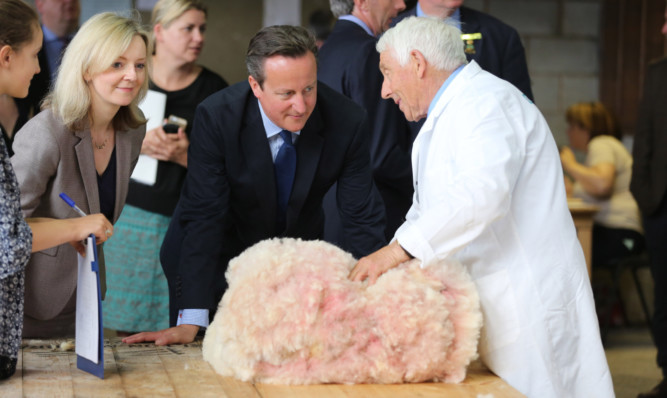Prime Minister David Cameron was at Builth Wells for the opening day of the Royal Welsh Show.
He is apparently the first serving Prime Minister to attend the show but more than that he was able to accompany his new Defra Secretary of State, Elizabeth Truss, on her first public event since being appointed last week
It was more than a social visit however, with Mr Cameron announcing what he claimed would be £400 million of potential new business for the British food industry.
He announced that from 2017, all of central government will commit to buying fresh, locally sourced, seasonal food through a new, simplified food and drink buying standard.
The scheme will be known as the Plan for Public Procurement.
The public sector in England spends £1.2 billion every year on food and drink.
Up to £600m of that is spent on imported produce, £400m of which could be sourced from within the UK.
In addition, the wider public sector is to be “encouraged and supported” in using the new framework with the expectation that all schools and hospitals will, in future, serve more locally reared meats and freshly picked fruit and vegetables.
Prime Minister David Cameron said: “Our long-term economic plan is all about backing the do-ers and the hard-workers and no one does more or works as hard in Britain today than our farmers.
“By opening up these contracts, we can help them create more jobs, invest in their businesses and make sure people in our country have a healthier lifestyle.”
Ms Truss added: “This move will mean that food served in canteens across the public sector can be more local, seasonal and tastier.
“It will help drive growth in Britain’s first class food and drink industry and benefit the environment through reduced waste, higher take-up of meals and less unappetising food left on plates.”
Public sector buyers will now have to judge potential suppliers against key criteria including looking at how food is produced and whether it is local.
They will also have to evaluate the health and nutritional content of the food, the resource efficiency in the production systems and how far the food bought meets Government’s socio-economic priorities such as involvement of small and medium businesses.
Finally, quality of service and value for money will have to be assessed.
In addition the new procurement system is designed to prioritise applications from smaller producers giving them access to the lucrative public sector market.
The UK Government will also put in place a new buying process from September, centred on an online portal.
Companies which register on this portal and meet the requirements of the procurement plan’s scorecard will automatically be alerted when any eligible contracts come up for tender.
The Royal Welsh announcement comes as 15 agri-tech projects were told they would receive a share of £18m of funding from Government and industry to help accelerate agricultural innovation and commercial viability.
